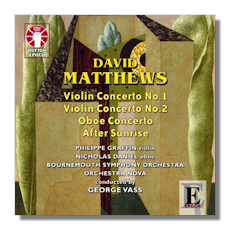
The Internet's Premier Classical Music Source
Related Links
- Matthews Reviews
- Latest Reviews
- More Reviews
-
By Composer
-
Collections
DVD & Blu-ray
Books
Concert Reviews
Articles/Interviews
Software
Audio
Search Amazon
Recommended Links
Site News
 CD Review
CD Review
David Matthews

Concertos
- Concerto for Violin #1, Op. 31
- Concerto for Oboe, Op. 57
- Concerto for Violin #2, Op. 57
- After Sunrise, Op. 82
Philippe Graffin, violin
Nicholas Daniel, oboe
Bournemouth Symphony Orchestra/George Vass
Dutton Epoch CDLX7261
David Matthews, who was born in London in 1943, begins his essay in the liner notes accompanying this CD from Dutton containing three concerti not otherwise available, "Because I am a composer who thinks primarily in terms of melody, the concerto is an attractive form for me." The works here are certainly melodic in the way that those of Britten, Tippett and Maw are. Though they're neither sentimental nor derivative. On this recording the Bournemouth Symphony Orchestra plays with panache and style under George Vass.
Matthews first violin concerto dates from the early 1980s and was inspired by Robert Bresson's film Four Nights of a Dreamer, which is in turn based on the novella by Dostoevsky, White Nights. Events in the composer's own life are also translated into the work, which uses violin, flute, clarinet and baritone saxophone programmatically. This technique can be hard to pull off; and it's probably not essential to this composition's success. But successful it is; there are some delightful melodies and textures and the overall mood of the concerto is melancholy with hints of resentment, anger even (surely that's what Matthews is expressing in the middle of the (vivacissimo) second movement [tr.2]), which was added later. What keeps the piece from drifting is the intensity of the thematic development; this works in tandem with, rather than independently of, density of orchestral texture. When this is coupled with the variety, the ebbs and flows of tempo and attack, the concerto becomes a nicely haunting work.
The Oboe Concerto was written ten years later to a commission for the London Schools Symphony Orchestra and Nicholas Daniel; that highly accomplished soloist performs it here too. In order to preserve the delicacy of the oboe's tone against a full orchestra, for which Matthews had been ased to write, he divided the instruments across different scorings in each of the five instruments; no oboe in the orchestra itself, only a cor anglais. The movements themselves are contrasting. You may or may not feel that this approach, and the variety of styles ensuing, carry off the concerto form and feeling. Or they may seem somewhat too fragmented. The fourth ("blues") movement, in particular, seems out of place. In either case, you're likely to admire Daniel's technique and interpretative sure-footedness; his is a remarkable performance. It never oversteps the writing provided for it, never dominates. Nor yet does it shrink.
In the Second Violin Concerto, begun 15 years after the first was eventually completed, Philippe Graffin plays with as much conviction and penetration as in the first. It was conceived while Matthews was travelling, and mirrors the idea of a (soloist's) journey. Its four movements last 20 minutes and play continuously. Like the other two concerti, the music is not "straightforward"; by that is meant that it's full of interest, incident and invention. Not that it's aggressively experimental or tonally eccentric. But it, too, retains your interest at every point. That the CD presents the works in the order in which they were written is useful; it allows us to see the development of David Matthews and at the same time identify those characteristics (inventiveness, gentle but never maudlin attachment to melody, suppressed lyricism, expert and exciting scoring) which delight.
After Sunrise was written at Peter Sculthorpe's home (like parts of the second Violin Concerto) and incorporates birdsong. It's less substantial than the concerti; but rounds out a useful, enjoyable and appropriate sample of the music of this somewhat overlooked composer. In particular, both the Bournemouth Symphony Orchestra and two soloists are on very top form and a delight to follow through their engagement with music that has challenges, yet which they each seem to brush aside in the interests of maximum communication. The acoustic and Dutton's recording are excellent; the background information in the booklet with photos and bios of the performers make this a CD not to be missed for anyone exploring all corners of contemporary British music.
Copyright © 2011, Mark Sealey.





















